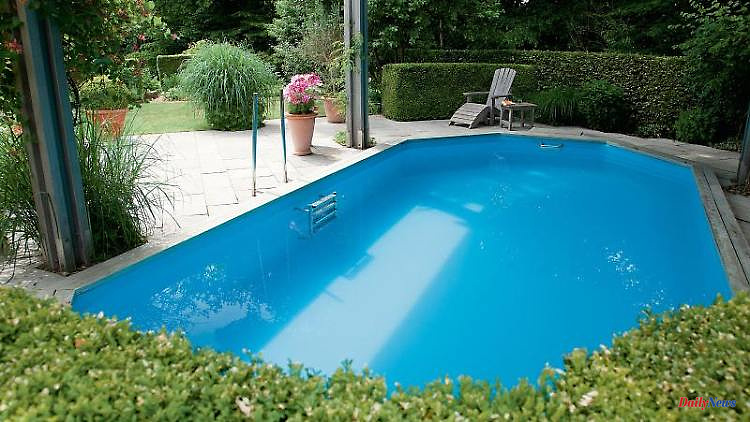A swimming pool in your own garden is attractive. The offer is as large as it is tempting. Before you start building, you should do some research. Permissions and rules must be observed.
In the warm months, many people probably dream of a bathing paradise in their own garden. There are said to be more than a million private pools in Germany. Interest is increasing, not least because of Corona. Before jumping into the refreshing water, however, dry reading is the order of the day. Because if you want to create a swimming pool, you should know about the legal framework.
Building requirements vary from state to state. Most countries do not require a building permit for swimming pools with a capacity of up to 100 cubic meters, says Ute Wanschura, Managing Director of the Federal Swimming Pool Association
Nevertheless, building regulations must be observed. Among other things, the development plan (B-Plan). If this excludes ancillary facilities, for example, "you can forget about the pool," says Holger Freitag, the trustee's attorney for the Association of Private Builders (vpb).
In addition, the development plan may contain specifications for surface sealing. These must be taken into account, so Freitag. In addition, the boundary distance to the neighboring property must generally be maintained at three meters. If the water is heated with heat pumps, the limit distance can also be relevant. The courts see it differently. Therefore it depends on the individual case.
Freitag draws attention to another special feature: the building use ordinance. It determines that ancillary facilities must be subordinate to the main building. This means that the ratio of pool to house size should match. Actually a matter of course.
According to the vpb expert, however, neighbors often use the requirement as an opportunity to take action against the bathing paradise next door, to raise objections and to sue. "Even if the building inspector should turn a blind eye: Caution is advised with the building use ordinance," he says.
Aspiring pool owners should take a critical look at their property during the planning phase. Usually the building authority has defined the area to be built over. If the home already fills this construction window, there is no longer any area available for the swimming oasis. At least not if everything is to be designed in accordance with building regulations. If the limit is ignored, there is a risk of trouble with the authorities and neighbors.
"The envy factor should not be underestimated," warns Ute Wanschura. She recommends talking to your neighbors about the project in advance - and inviting them to splash around later.
Incidentally, the legal requirements can also be applied to large above-ground pools, such as those with metal walls. An inquiry to the building authority provides clarity about the local rules for swimming pool construction and thus prevents problems.
Noise limits must be observed when operating and using the pool. Swimmers are bound to the usual rest times, i.e. mostly midday from 1 p.m. to 3 p.m. During the night's rest between 10 p.m. and 6 a.m. nobody is actually allowed to dive into the pool. "This is a problem for early swimmers and nocturnal swimmers," says Holger Freitag.
The rest periods also apply to children. Outside of this they are allowed to romp in the water and make noise. Because: "Children's noise must be accepted as long as it is within the socially appropriate framework," says the lawyer.
In addition to children and swimmers, the heat pump is a source of noise. The device must not exceed certain limit values. The level of the limits depends on the type of area in which the pool is created. A purely residential area is viewed differently than a mixed-use area. The technical instructions for protection against noise (TA Lärm) provide orientation. If the heat pump is working too loudly, the neighbors can get involved. You may be entitled to an injunctive relief. Then it has to be quieter.
Pools are a potential hazard. The Civil Code therefore makes swimming pool owners responsible and liable. You must ensure that nobody gets hurt and secure the pool. One contribution are garden fences. They mark the property as private property and signal strangers "no trespassing".
Pool covers promise more security. They are available in walk-in versions, so that the covered area can also be used for a barbecue party. In addition, covers reduce heating costs and cleaning effort because less heat is lost and less dirt gets into the water.
Pool alarm systems give signals when someone falls into the water. "But that's no use during the holiday season if nobody is there who can save you," says Ute Wanschura. According to Wanschura, professional swimming pool builders are required to advise their customers on how to use the pool safely. Some companies have the instruction acknowledged.
Fresh water must be in the pool at least once or twice a year. The question arises as to what to do with the dirty water. "Never let it seep away in the garden. Because of the additives, the water is a chemical cocktail," says Holger Freitag. It should be disposed of through the sewer. As in the household, there are fees to be paid for this. Anyone who simply disposes of it in the botany not only risks prosecution for tax evasion, but also problems with the environmental authorities.
As a rule, no permission is required for filling the pool with water from the public network. However, as a precautionary measure, the municipality should be consulted. Restrictions come into play when municipalities limit water consumption in summer due to drought.
(This article was first published on Wednesday, June 08, 2022.)












